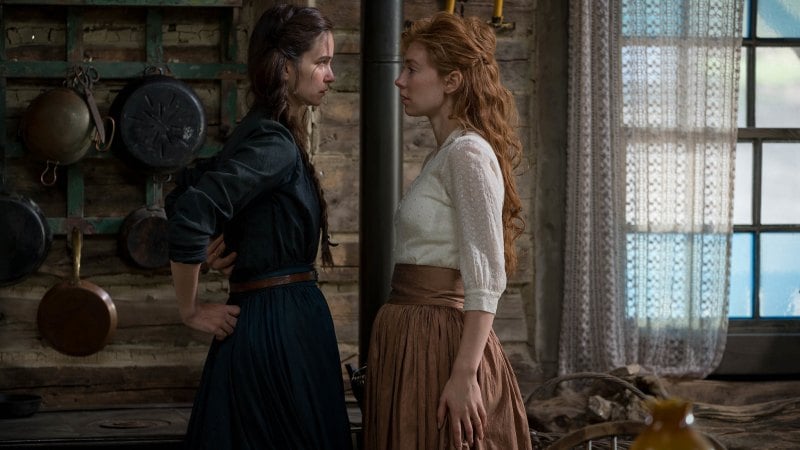This is the second piece in the Sundance Film Festival 2021 series by Julie Fukunaga and Olivia Popp. Follow along for coverage of films from Sundance’s reimagined virtual festival.
Making its U.S. premiere in the Spotlight section of Sundance 2021, Mona Fastvold’s “The World to Come” seeks the slow burn sentimentality of queer period films of the past but can’t escape the clutches of its dry script. The burgeoning hidden romance between 19th century rural upstate New York homemakers Abigail (Katherine Waterston) and Tallie (Vanessa Kirby) has the makings of a standard period romance of classic queer restraint and escape from heterosexual monotony. For what it’s worth, it does just that — with pleasing landscapes and meditative direction to boot. But the film, co-written by Ron Hansen and original “The World to Come” short story author Jim Shepard, while visually smooth and otherwise well-crafted by Fastvold, fails to ignite the spark it needs to capture a viewer’s heart. The film premiered at the Venice Film Festival in September 2020, and Bleecker Street acquired U.S. distribution rights for the film soon after. “The World to Come” began its limited theatrical release on Feb. 12 and will be available for streaming on demand beginning on March 2.
Clocking in at just over 90 minutes, the film’s very reasonable runtime falls into a somewhat rhythmic gait that makes it feel like it drags on for much longer than it actually does. “The World to Come” languishes in the solemnity of Abigail’s and Tallie’s visits, stuck in tropes of period piece longing and the inevitability of fatality. Despite Waterston’s and Kirby’s gently flirtatious banter, “The World to Come” is similarly weighed down by the overly-stylized dialogue that replaces opportunity for performance with fabricated linguistic authenticity. The speech makes its most heavy-handed appearances during the bleating complaints of Abigail’s reserved husband Dyer (Casey Affleck) and Tallie’s decidedly more controlling Finney (Christopher Abbott), both farmers.
The loss of Abigail and Dyer’s young daughter early in the film hangs over the beginning of Abigail’s story but quickly loses its power with her first sight of Tallie. First sharing in each other’s company to avoid their bleak, unchanging lives, Abigail and Tallie’s romance plays out all too predictably in a way that mirrors how it was written in Shepard’s epistolary tale by the same name — likely rich with descriptive prose and subtext that makes for an excellent short story. However, all that’s left of it in the film is voiceover from Abigail, read as extracts drawn from her diary, and lines directly pulled from the short story itself. It doesn’t necessarily work, but it also doesn’t necessarily not work, leaving the narration as an artifact of the story’s first form rather than an integral part of the film’s cinematic world.
Dyer’s and Finney’s scenes spent soliloquizing about their wives’ increasingly errant time together grows more infuriating over the course of the film, but this merely exacerbates the conditions that the women are in. They are forced between a rock and a hard place, torn between fulfilling their expected responsibilities as homemakers while their husbands labor or spending the day with each other and preparing to suffer the consequences of cold food and an empty table. Perhaps most telling is that the film’s most heart-wrenching endeavor is not one between Abigail and Tallie. Rather, it’s a scene of a house horrendously ablaze as Abigail narrates the devastating loss of a fellow townsperson’s daughter, stuck in the upper level of the house as a fire set by the other daughter takes to the building.
The cruel machinations of Finney become a thorn in the side of Abigail and Tallie’s romance, making Dyer his foil and otherwise more empathetic counterpart, despite sharing similar grievances as Finney’s. But as Finney turns verbally abusive and is highly suggested to be physically abusive as well, Tallie grows increasingly defiant. The women engage in hasty, covert meetings — picnics in the woods, passionate moments behind closed doors. Finney’s absolutely intolerable behavior becomes the driver behind the forced separation of Abigail and Tallie, drawing their time together to an abrupt close. As Abigail reflects, her memories are suddenly punctuated by scenes of the two women making love, strung together into a whirlwind montage at the very end while the rest of the film constrains itself to breathless, (mostly) fully-clothed kisses and little more. Fastvold’s choice to include the sex scenes in a single moment as Abigail reflects on her fleeting relationship with Tallie is a respectable effort to inject the script with life and genuinely depict their relationship beyond a restrained fantasy. Nonetheless, it ultimately falls prey to a patriarchal fixation on the overtly sexual as the cornerstone of Abigail and Tallie’s time together. With these memories flooding back to Abigail, their love is thus reduced solely to their time spent in bed — souls and chests bared exclusively for the audience — rather than being stitched naturally into the landscape of their relationship.
The chemistry between Waterston and Kirby holds the film’s core together in a very necessary way for fear of letting “The World to Come” become overwhelmingly stagnant. Fastvold’s creative strengths appear to lie in extracting what she can from the script’s bare bones and likely would have crafted a more engaging piece from a vastly different script, even from the same story. “The World to Come” comes out aesthetically pristine but little more, disappointingly never succeeding where it might have the opportunity to with Shepard’s narrative.
